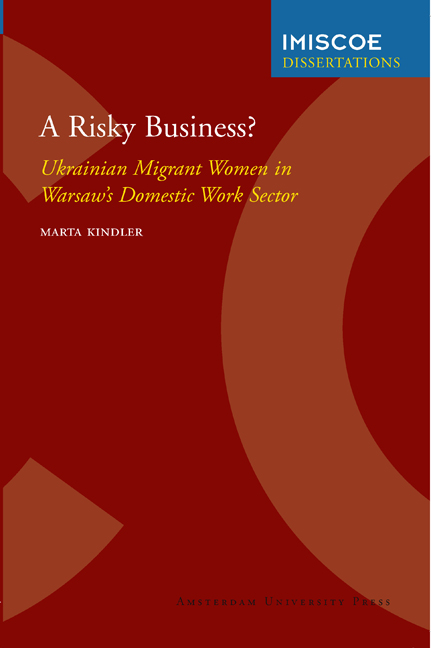Book contents
- Frontmatter
- Contents
- Acknowledgements
- 1 Ukrainian Migrant Women, Migrant Domestic Work and Risk
- 2 Risk, Migration and Migrant Domestic Work: Selected Theory and Research Review
- 3 Theoretical Approach and Research Methodology Applied in this Study
- 4 Ukrainian Migrant Women’s Images of Risk
- 5 Legal Risks of Migration and Legal Risk-Balancing Strategies
- 6 Risks and Risk Strategies in Migrant Domestic Work
- 7 Familiar Risk: Ukrainian Women in the Polish Domestic Work Sector
- Notes
- References
- Other IMISCOE Titles
4 - Ukrainian Migrant Women’s Images of Risk
Published online by Cambridge University Press: 20 January 2021
- Frontmatter
- Contents
- Acknowledgements
- 1 Ukrainian Migrant Women, Migrant Domestic Work and Risk
- 2 Risk, Migration and Migrant Domestic Work: Selected Theory and Research Review
- 3 Theoretical Approach and Research Methodology Applied in this Study
- 4 Ukrainian Migrant Women’s Images of Risk
- 5 Legal Risks of Migration and Legal Risk-Balancing Strategies
- 6 Risks and Risk Strategies in Migrant Domestic Work
- 7 Familiar Risk: Ukrainian Women in the Polish Domestic Work Sector
- Notes
- References
- Other IMISCOE Titles
Summary
The Ukrainian women had to go through a particular thought process before they took their migration decision to go work in Poland's domestic work sector. What role did risk play as their decisions were being made whether to migrate, where to and what type of work to engage in? The women had to create a particular image of migration as a worthwhile undertaking. To analyse this process, I introduce the notion of the imagined opportunity space (Schiffauer 2006). An imagined opportunity space is tied to reality as a representation of something that can happen in the future. It can be expressed by using unreal conditional sentences, which have four interrelated characteristics: premise, category, evaluation and condition. Since risk involves a similar thought exercise on possible future outcomes, it can also be said to belong to the sphere of the imagined.
The first characteristic of the imagined opportunity space, premise, displays the causal relationship between X and Y, for example: ‘If I go abroad [X], then I will earn a lot of money [Y].’ A premise is created and reproduced through social interactions during which biased information about specific countries is interpreted. Risk is also reflected upon through the use of unreal conditional sentences of the type ‘If X…, then possibly Y may occur.’ What type of premises do the Ukrainian migrant women refer to when evaluating migration risks?
The second assertion of the imagined opportunity space has to do with the category to which a person belongs: does he or she have the qualities required to be able to identify with migrants? If we know someone abroad who is somehow similar to us (and thus belongs to the same category), we can identify with their lot. Such identification makes it possible to consider migration: ‘If she can work abroad, why can't I?’ The probability of identifying with the fate of compatriots abroad rises with migration becoming a mass phenomenon, instead of an escapade of a few brave eccentrics. Another factor that determines the type of risk imagined is a person's multiple categories or, better, identities. With whom did the women identify when considering migration? How did this influence their evaluation of migration risks?
The third feature relates to evaluation of the imagined space – in other words, is it good or bad to migrate to a particular country?
- Type
- Chapter
- Information
- A Risky Business?Ukrainian Migrant Women in Warsaw’s Domestic Work Sector, pp. 63 - 104Publisher: Amsterdam University PressPrint publication year: 2012



